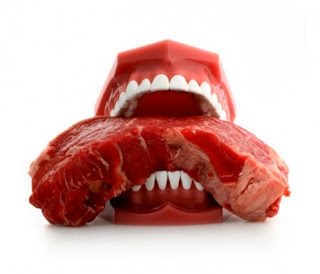The Environmental Working Group (EWG) released the “Meat Eaters Guide to Climate Change + Health”
Monday, and it contains a few surprises for climate-conscious eaters.
EWG staffers linked up with lifecycle analysis firm CleanMetrics to come
up with a nifty set of infographics and guidelines for health- and
climate-conscious carnivores. It’s part of a recognition that
industrialized societies are not about to go veg any time soon, so at
least we can make sound judgements about how much and which kind of meat
to eat.
According to EWG, the top five worst climate culprits are, in order:
lamb, beef, cheese, pork, and farmed salmon. Cheese at No. 3 and salmon
at No. 5 surprised me, and though lamb is the worst climate offender,
it’s a tiny fraction of U.S. meat consumption and not a real contributor
to our climate woes. For the record, lamb tops beef in climate impact
mostly because of the smaller amount of meat per animal — not because of
anything inherent in the way lamb is raised.
Cheese consumption, on the other hand, is through the roof, thanks in large part to government efforts to promote consumption. So it’s quite something to learn that it’s as bad as meat in terms of climate impact (not to mention health).
For low-impact meats, EWG recommends turkey, chicken, tuna, and eggs.
Hang on — tuna? While I applaud them for documenting the fact that
farmed salmon is not a sustainable option, I think recommending a source
of protein that’s in the middle of an extinction crisis strikes me as a lame call. Bad, EWG, bad!
That said, a comparison of the relative climate impact of a reduction
in your meat consumption remains one of the report’s best features. For
example:
- If you eat one less burger a week, it’s like taking your car off the road for 320 miles or line-drying your clothes half the time.
- If your four-person family skips meat and cheese one day a week, it’s like taking your car off the road for five weeks — or reducing everyone’s daily showers by 3 minutes.
- If your four-person family skips steak once a week, it’s like taking your car off the road for nearly three months.
- If everyone in the U.S. ate no meat or cheese just one day a week, it would be like not driving 91 billion miles — or taking 7.6 million cars off the road.
For those of us who think about the climate impact of our everyday
activities, it’s incredibly helpful to put small personal changes into
context. Who knew one less burger a week could be so significant?
The main conclusion — no surprise here — is to eat less meat. But the
EWG report also offers a good set of guidelines for eating “greener
meat,” which has the following qualities:
- Grass fed or pasture-raised meat has fewer antibiotics and hormones and in some cases may have more nutrients and less fat; livestock live in more humane, open, sanitary conditions.
- Lean cuts: less fat will likely mean fewer cancer-causing toxins in your body.
- No antibiotics or hormones: reduces unnecessary exposure and helps keep human medicines effective.
- Certified organic: keeps pesticides, chemical fertilizers and genetically modified foods off the land, out of the water and out of our bodies.
- Certified humane: means no growth hormones or antibiotics were used and ensures that animals were raised with enough space and no cages or crates.
- Unprocessed, nitrite-free and low-sodium: avoid lunchmeats, hot dogs, prepackaged smoked meats and chicken nuggets.
- Sustainable Seafood: avoid airfreighted fish and farmed salmon; consult Monterey Bay Aquarium’s list of the most sustainable seafood choices at montereybayaquarium.org/cr/seafoodwatch.aspx
Switching to pasture-raised meat appears to have another benefit unrelated to the climate fight. According to new research out of the University of California at Berkeley (and picked up by Nicolette Hahn Niman at The Atlantic), it just might save the bees.
Rangelands are technically “artificial environments,” but when
properly managed they offer “undisturbed ground, cavities in the ground
and trees, and hollow-stemmed grasses and reeds that are suitable for
species of ground-nesting, wood- and cavity-nesting, and stem-nesting
bees.” Basically, paradise for wild bees.
The researchers used California as a case study and determined that
despite colony collapse disorder (CCD), wild bees (most of whom live in
rangelands) already represent between 35 and 39 percent of crop
pollinators. Since pollination is a commercial industry, wild bees add
between $937 million to $2.4 billion every year to the state’s economy.
In fact, if more rangelands are developed and maintained near farm
fields, it’s theoretically possible for farmers to rely almost entirely
on wild bees to pollinate their crops. Take that, CCD!
Ergo: More consumers eating pasture-raised meat for climate and
health reasons means more pasture, which in turn means more bees and
less money spent by farmers to pollinate their crops. It’s all proof
that when we dedicate ourselves to ethical eating, the rewards to
ourselves — and the bees! — keep coming.
By Tom Laskawy@grist

Thanks so much for this! I haven't been this thrilled by a post for a long time! You have got it, whatever that means in blogging. Anyway, You're certainly somebody that has something to say that people should hear. Keep up the good work. Keep on inspiring the people!
ReplyDeleteGourmet Secrets Canada